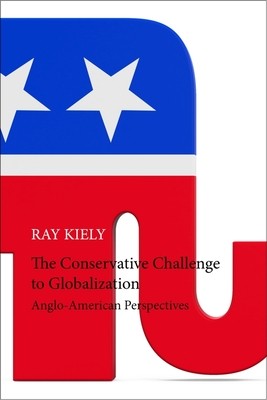
- We will send in 10–14 business days.
- Author: Kiely
- Publisher: Agenda Publishing
- ISBN-10: 1788210964
- ISBN-13: 9781788210966
- Format: 15.8 x 23.6 x 2.5 cm, kieti viršeliai
- Language: English
- SAVE -10% with code: EXTRA
Reviews
Description
Ray Kiely examines the conservative discourse of "winners" and "losers" of globalization that has emerged since the financial crisis and which has been used to reflect real and imagined threats to domestic economies and national identity. Both the election of Donald Trump and the UK's Brexit vote are potent examples of the success of this conservative (anti-)globalization rhetoric, which has informed popular mantras of deregulation and economic nationalism.
The book explores the nostalgia for a former supposed age of economic and societal harmony that has charaterized US and UK conservative responses to the increasing interconnections in the global economy. It provides both an account of the "crisis of globalization" and the wider resurgence of populism, as well as a detailed examination of new US and UK conservative movements (alongside earlier traditions) and the development of conservative ideas, in particular projects for renewal, and how these have shaped responses to globalization that challenge neoliberal and third way approaches.EXTRA 10 % discount with code: EXTRA
The promotion ends in 23d.06:48:21
The discount code is valid when purchasing from 10 €. Discounts do not stack.
- Author: Kiely
- Publisher: Agenda Publishing
- ISBN-10: 1788210964
- ISBN-13: 9781788210966
- Format: 15.8 x 23.6 x 2.5 cm, kieti viršeliai
- Language: English English
Ray Kiely examines the conservative discourse of "winners" and "losers" of globalization that has emerged since the financial crisis and which has been used to reflect real and imagined threats to domestic economies and national identity. Both the election of Donald Trump and the UK's Brexit vote are potent examples of the success of this conservative (anti-)globalization rhetoric, which has informed popular mantras of deregulation and economic nationalism.
The book explores the nostalgia for a former supposed age of economic and societal harmony that has charaterized US and UK conservative responses to the increasing interconnections in the global economy. It provides both an account of the "crisis of globalization" and the wider resurgence of populism, as well as a detailed examination of new US and UK conservative movements (alongside earlier traditions) and the development of conservative ideas, in particular projects for renewal, and how these have shaped responses to globalization that challenge neoliberal and third way approaches.

Reviews